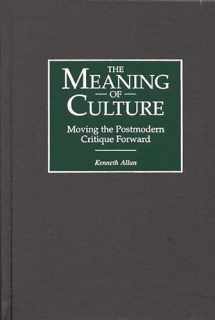
The Meaning of Culture: Moving the Postmodern Critique Forward
Book details
Summary
Description
Building upon the insights of postmodernism, this book argues for an approach to studying culture that has as its basis the social construction of meaning and reality and emphasizes micro-level processes and emotion. In general, postmodernism privileges the structure of culture and posits that due to identifiable social dynamics, the structure of culture has become fragmented and has left the experience of cultural reality by human actors pluralistic, uncertain, and emotionally flat. This emphasis on structure has been emulated by many of the major contemporary theoretical approaches to culture. This work critiques the structural approach found in postmodernism and current cultural theories that neglects agency, affect-meaning, and the micro-level processes of meaning and reality construction. On the other hand, postmodernism has brought attention to a diverse array of social processes that are at work in late-capitalistic countries. Thus, in the final chapter of the book, the proposed micro-level, affective theory is situated within the macro-level processes of postmodernity. The postmodern critique is grounded and advanced by theoretically linking macro-postmodernism with micro-reality. This book will be of interest to students and faculty in sociology and cultural studies.


We would LOVE it if you could help us and other readers by reviewing the book
Book review



